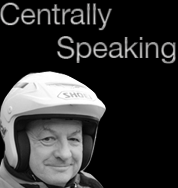 April was my last column, and no, I haven’t lost all interest in trials, quite the opposite in fact. Not HAVING to write something every weekend has allowed me to enjoy my trials without (I was going to say pressure, but that is a word that is SO overused) having to think about the next column every time I’m out riding, observing or officiating.
April was my last column, and no, I haven’t lost all interest in trials, quite the opposite in fact. Not HAVING to write something every weekend has allowed me to enjoy my trials without (I was going to say pressure, but that is a word that is SO overused) having to think about the next column every time I’m out riding, observing or officiating.
This can only ever be a personal view but when has that ever stopped me! I’ve only been to one World Championship round this year at Penrith and I have to say that it was both enjoyable and well organised. The current forum chat is with regard to stop allowed or no-stop in World Championship events. In my opinion I think it has to be stop allowed as it has been this year. And here’s my reason why.
World Championships are the pinnacle of the sport and a significant number of the riders (possibly all?) receive some financial reward based on their results, even if it is only bike and expenses. Never mind whether stop or no-stop is interesting/boring to the spectators, the crucial point about retaining stop allowed is that it takes a huge decision away from the amateur observers. If the series is no-stop then, make no mistake about it, observering decisions about whether the bike has stopped or not will materially affect a rider’s result at some point in the series, and potentially his financial reward. Trying to see if the bike has momentarily stopped is not the same as seeing if the rider has put his foot down.
I make this decision from observing myself. Not at a WC event but recently at several trials – the Lakes Two Day, the Scott and my own club’s Saturday afternoon trial. The first two were no-stop, the last stop allowed and if I am honest, observing a no-stop trial is far more difficult than observing a stop allowed trial.
At the Lakes in particular I let many momentary stops go without penalty because (as a rider myself) I understood that the competitor was attempting to ride no-stop and because the inherent nature of modern trials bikes and the section severity virtually forced many riders to momentarily stop within a section.
If anybody doesn’t like this observation, then get real. Let me remind these folks that the Lakes and the Scott and other such trials are days of sport. There’s no money, little fame and certainly no reason to be harsh on a rider just because I’ve decided he has “stopped” when he’s making every effort to move forward.
I can’t think of any other sport where the decision of an official - and an amateur one at that – can so materially affect the event result without there being immediate recourse to a second opinion via a tape replay or a second official.
As regards spectator enthusiasm I don’t think that stop allowed or no stop will materially affect spectator attendance. Frankly, if a WC event is coming to your country or area, then I believe that those interested will to attend no matter whether the marking system is not to their own requirements.
So there – put that in your pipe and smoke it!
I see that my last column was way back in April. Much has happened since then. The Scottish has come and gone. I’ve been to numerous road race meetings, ridden loads of trials, been abroad and had the top box stolen off my road bike at an off-road hill climb, continued being a club secretary, written a few words for various sources in fact lived my life in and around bikes when it comes to weekends. In fact this Wednesday I’m off to the Milan Show with six pals for three days, so whilst I may have stopped writing this column, I’ve still all the interest I ever had.
One of the real joys is knowing so many people. On the final day of the Scottish I went out to the morning’s first group of sections at Callart. Apart from the observers and riders I was the only spectator there. I sat at the section, camera in hand and of the 230 or so riders who walked up to look at the final hazard, I bet 90% stopped to have a few words. It was great and I returned home that afternoon thinking what a great sport I’ve been involved with. I’m absolutely useless remembering names – it’s not my mind going - I’ve always struggled to put names to faces, but even so, names are not necessary when two enthusiasts, one rider, one a spectator, can together enjoy the day, the scenery and the sport.
It was the same at the Lakes. I observed two sections each day and with the results being on punch cards there’s the opportunity to have just a few words with each and every rider as they have their card punched. It’s so easy to get deeply involved with the controversies that are inherent in all sports without looking at the bigger picture; you are out in the countryside, with your bike and doing the things that for six days each week you look forward to.
Simply magic is trialing.
